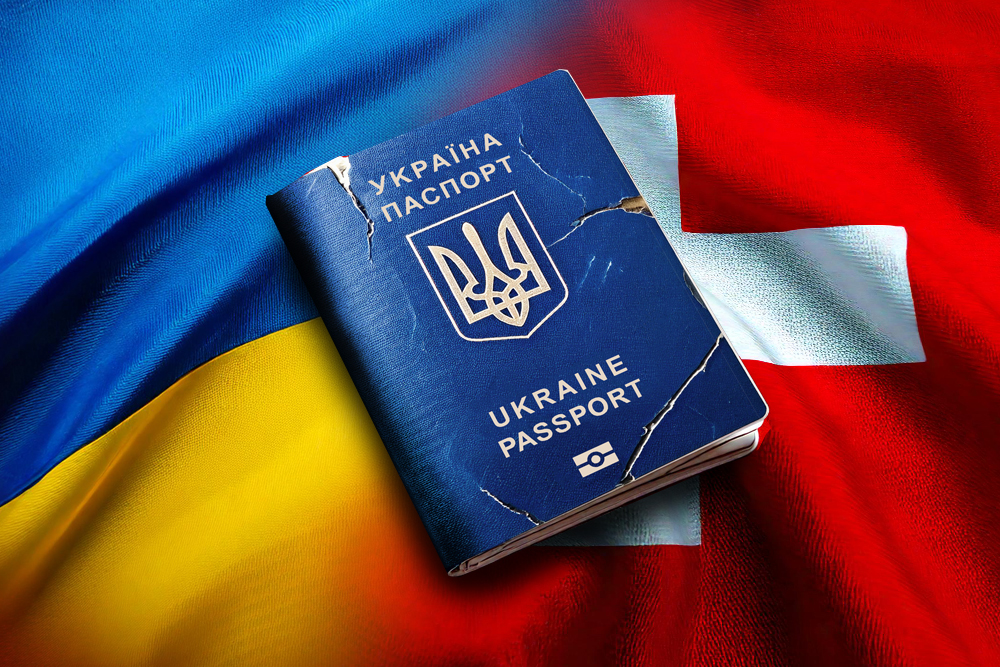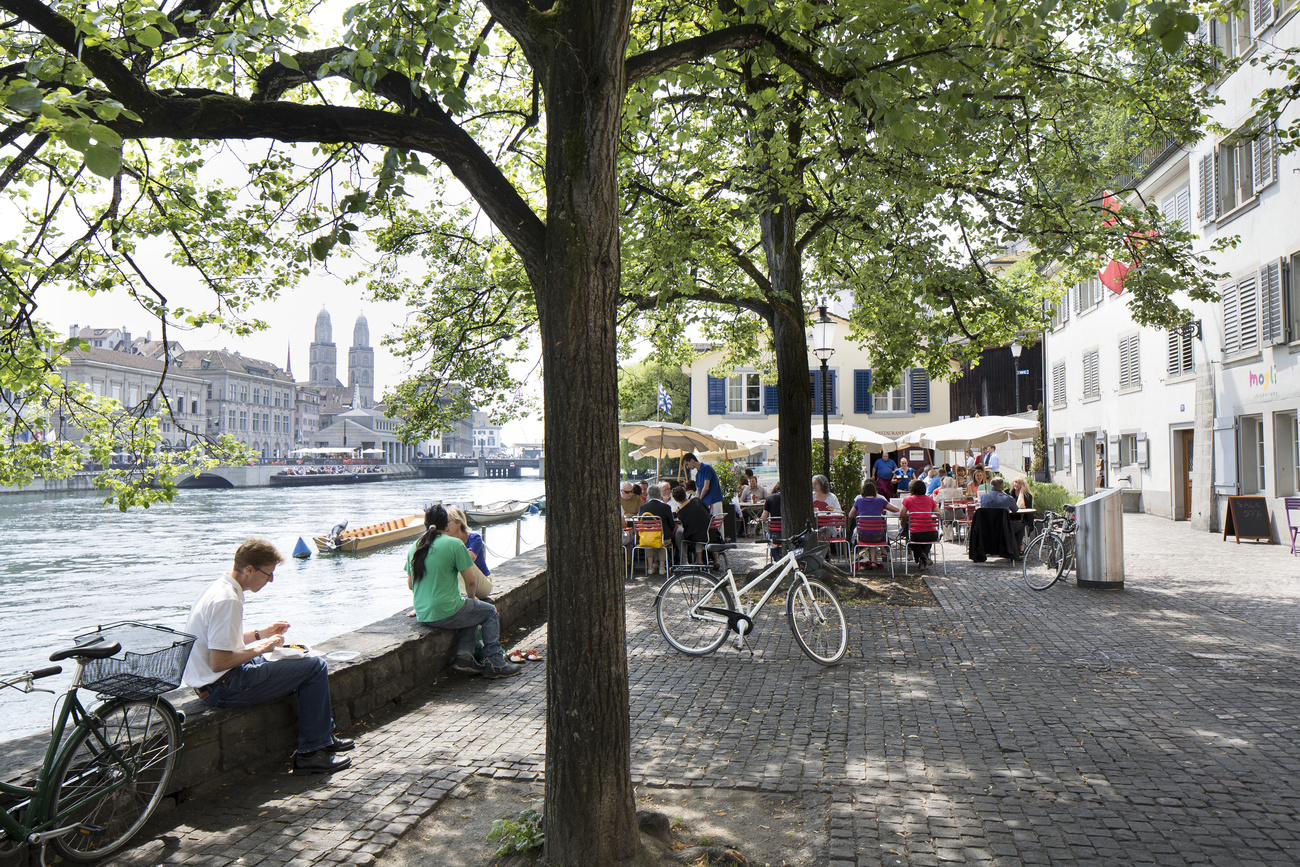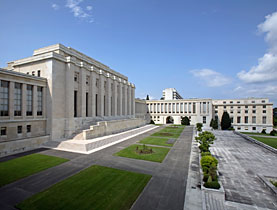Anti-racism meeting a “foreseeable disgrace”

The Swiss press has condemned anti-Israel comments by Iran's president at a meeting in Geneva, while showing little patience with Switzerland's position.
On Monday, Mahmoud Ahmadinejad blasted Israel as “a totally racist” regime on the opening day of the contentious United Nations racism summit in Geneva, prompting a walkout. The Swiss representative stayed seated.
The incident brought the Geneva conference closer to repeating the controversy of the UN’s first anti-racism meeting in Durban, South Africa, eight years ago.
Several European states, as well as Canada, Israel and New Zealand, had pulled out of the conference before it began.
“The anti-Semitic speech of Iranian President Ahmadinejad is an open appeal to racial hatred, a mockery of the values as enshrined in the Universal Declaration of Human Rights, wrote Jürg Müller in the Bern paper, Der Bund.
“He is the most prominent representative of dictatorships and authoritarian regimes… The Geneva conference will provide representatives of those countries with a platform to fight for rights that they themselves oppress.”
The Blick tabloid, Switzerland’s largest circulation daily, lambasted what it called “the foreseeable disgrace of Geneva”.
“Picture of hatred” was its caption to a picture of Ahmadinejad. “The agitator of Tehran rages against Israel. The anti-racism conference was over before it started.”
Ahmadinejad’s speech had sparked protests from pro-Israeli students in the audience, who donned coloured wigs and red noses, prompting diplomats from several European governments to walk out. Switzerland’s representative, Dante Martinelli, stayed.
“Martinelli could have actually stood up,” the Blick wrote. “Or should have.”
The Berner Zeitung ran a headline reading “Hate speech: Swiss delegates stay in the hall”.
“He did not move”
La Tribune de Genève also had critical words for the Swiss ambassador over his decision to hear out Ahmadinejad’s address.
“Last night, the disillusionment was clear on diplomats’ faces,” commented the newspaper.
“What can be retained from the day is the blow by Mahmoud Ahmadinejad, the powerlessness of the European Union in finding a common position on human rights and Switzerland’s indecision.”
Other newspapers found the entire affair regrettable, including the days leading up to the conference.
“Again, official Switzerland stands in the rain,” wrote the Neue Zürcher Zeitung in reference to a meeting on Sunday evening between Swiss President Hans-Rudolf Merz and Ahmadinejad.
“The unabated unspeakable comments by the Iranian president at the conference seem to have proven its critics right,” it added, but said the Swiss government had “quite a few good arguments” for hosting the conference. It said it was better for “sinners” to be represented in Geneva, so that they could be addressed.
“No choirboy”
Berner Zeitung commentator Stefan Geissbühler argued, albeit with a lengthy caveat, that the meeting was justified.
“Of course Mahmoud Ahmadinejad is no choirboy. Of course it is absolutely unacceptable that he denies the Holocaust and Israel’s right to exist,” he wrote.
Switzerland has been representing Washington’s interests in Tehran since 1980 and plays a diplomatic role, Geissbühler reminded readers. “Only with dialogue can hardened conflicts like the one between Iran and the US be solved. This also applies for the conflict between Israel and the Palestinians.”
The French-language daily, Le Temps, agreed that despite the conference’s rough start, channels of dialogue needed to remain open.
“By pulling out, these various western states have mistaken the mission of multilateral organisations. As imperfect as they are, the UN remains a necessary multilateral fortress for dialogue. That was the place to respond to Ahmadinejad,” ran its editorial.
But commentator Luciano Ferrari in the Tages-Anzeiger wrote that the invitation granted for Ahmadinejad to speak was a mistake. His headline read: “Naïve and preposterous”.
“Will be remembered”
“Two scenes from the Geneva UN conference against racism will be remembered,” Ferrari wrote. “The welcome of the Iranian president by the frivolous friendly smiling Swiss president, Hans-Rudolf Merz, and on the other hand, the appearance of Tehran at the UN lectern not 24 hours later, in which he unleashed hate speech against Israel and Zionism.”
“Swiss diplomacy has learned nothing from the last disgrace,” Ferrari wrote, referring to the last high profile encounter between the two countries. In 2008, Foreign Minister Micheline Calmy-Rey donned a headscarf for a meeting with Ahmadinejad in Tehran.
The Fribourg-based La Liberté was not ready to write off the conference just yet. It asked: “How will the rest of the Geneva conference evolve?”
“Western countries have succeeded in erasing all references to Israel from the final declaration. Last Friday, some of them were even saying that Iran had lost the battle. After Monday, nothing is certain anymore.”
swissinfo
UN SECRETARY-GENERAL BAN KI-MOON
“I deplore the use of this platform by the Iranian President to accuse, divide and even incite. We must all turn away from such a message in both form and substance.”
ISRAELI PRIME MINISTER BENJAMIN NETANYAHU
“We will not allow Holocaust deniers to carry out another Holocaust against the Jewish people.”
CZECH FOREIGN MINISTRY (HOLDER OF EU PRESIDENCY)
“We cannot allow, through our presence, the legitimisation of absolutely unacceptable anti-Israeli attacks.”
CHIEF VATICAN SPOKESMAN FATHER FEDERICO LOMBARDI
“Naturally, speeches like that of the Iranian president do not go in the right direction, because, even if he did not deny the Holocaust or Israel’s right to exist, his expressions were extremist and unacceptable.”
SYRIAN DELEGATION LEADER FAYSAL MEKDAD
Differences of opinion should be expected at big UN conferences, he said. “In Syria we consider this to be natural, as such differences could be healthy.”
PAKISTAN DELEGATION CHIEF MAWABZADA MALIK AMAD KHAN
There needs to be continued participation at the conference, he said. “In our view engagement rather than estrangement is the better course of action.”
IRANIAN LAWMAKER MOHAMMAD REZA BAHONAR
“A great achievement for the [Iranian ruling] system.”
HUMAN RIGHTS WATCH
“The sad truth is that countries professing to want to avoid a reprise of the contentious 2001 racism conference are now the ones triggering the collapse of a global consensus on the fight against racism.”
The United Nations Durban Review Conference runs until April 24. It will evaluate progress towards the goals set by the World Conference against Racism, Racial Discrimination, Xenophobia and Related Intolerance in Durban, South Africa, in 2001.
The conference has already adopted an action plan to provide a new framework for guiding governments, non-governmental organisations and other institutions in their efforts to combat racism, racial discrimination, xenophobia and related intolerance.
Among its measures are strengthening education, fighting poverty, improving resources available to victims of racism, and bolstering respect for the rule of law and for human rights. Critics say little of this has happened since 2001.

In compliance with the JTI standards
More: SWI swissinfo.ch certified by the Journalism Trust Initiative












You can find an overview of ongoing debates with our journalists here . Please join us!
If you want to start a conversation about a topic raised in this article or want to report factual errors, email us at english@swissinfo.ch.